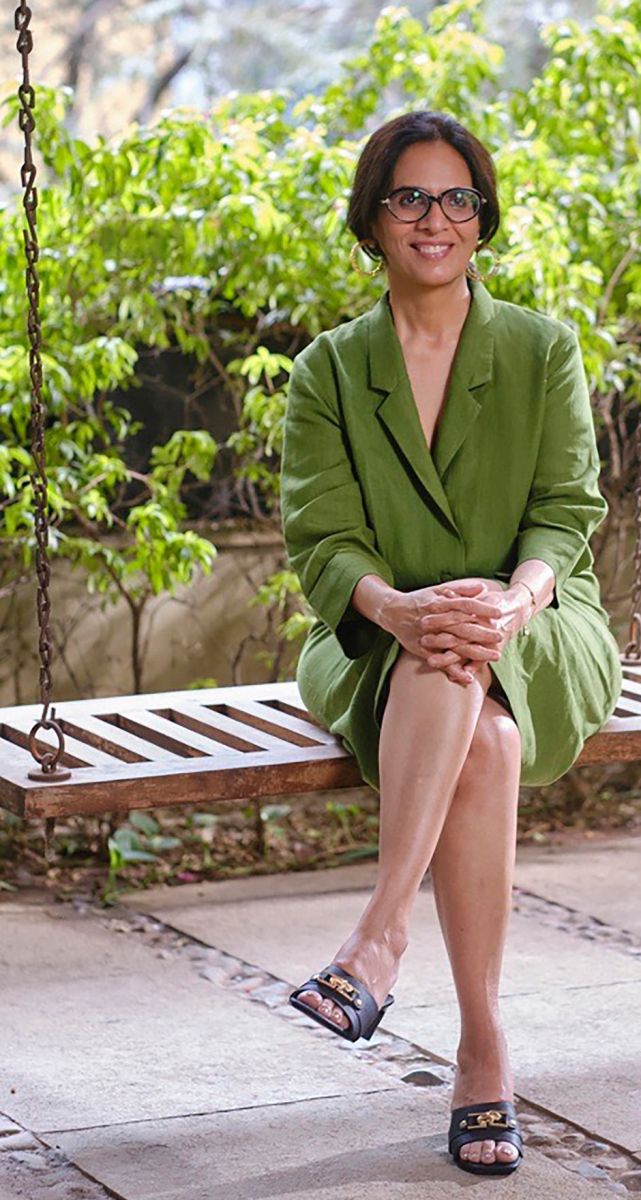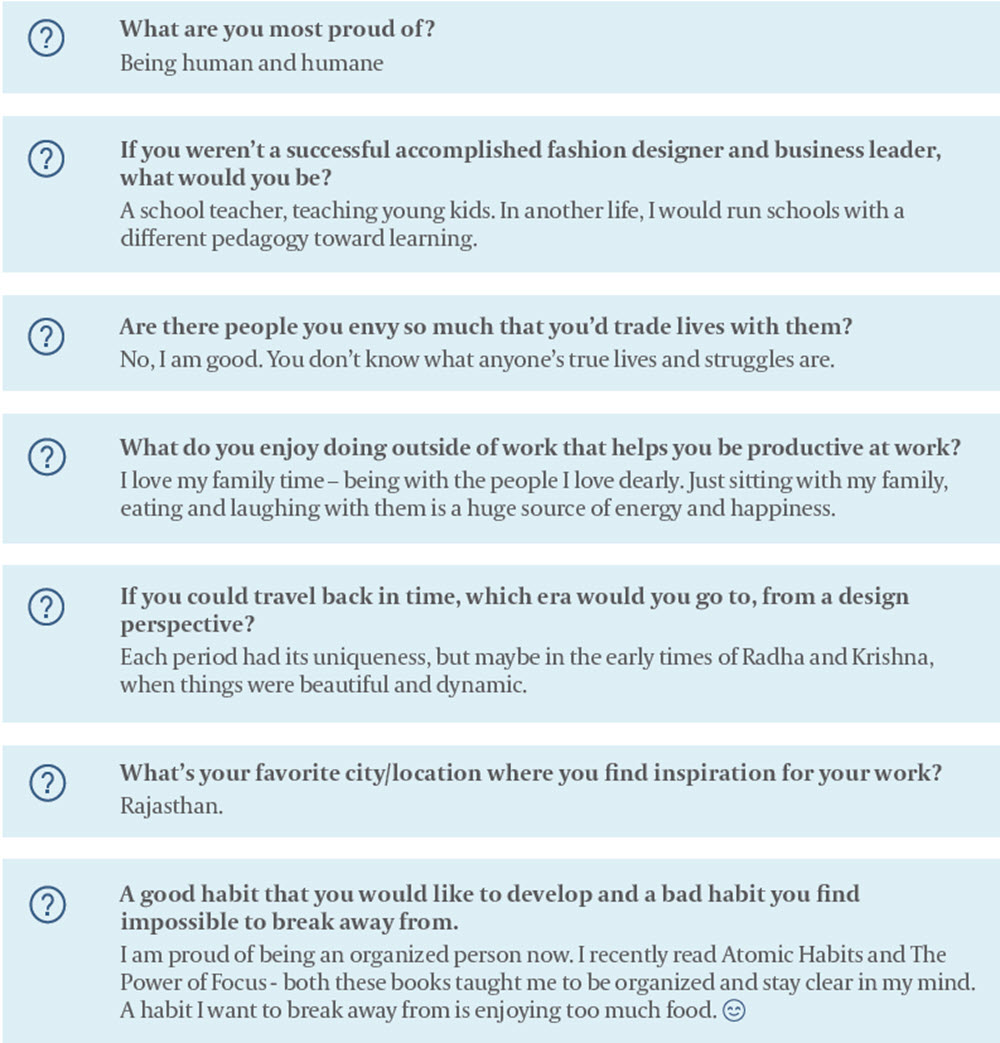Editor's Note: This interview is part of the Blazing a Trail: Women in Leadership series
Anita Dongre has been a true icon in the Indian fashion industry for over two decades. From starting her business from her home balcony to dressing renowned personalities, such as Priyanka Chopra, Beyoncé, and Hillary Clinton, her brand has gained immense respect and recognition. But beyond her creative abilities, what sets her apart is also the fact that her brand was built from a simple thread, embodying her personal journey. From persuading her family to support the start of her career to leading a team of 2,500 employees, she has never shied away from any task, having done them all herself at some point.
We sat down with Anita to delve into her upbringing and remarkable trajectory in a time when it was unconventional for women to pursue professional careers. The House of Anita Dongre stands tall today, constructed brick by brick, but not before overcoming numerous barriers. Above all, Anita remains steadfast in upholding her values and strives to bring joy to both her clients and the rural artisans who contribute their craftsmanship to her designs.
This conversation inspired us to remember that the path to success is not always a quick or easy one. As Anita put it, “The journey to success is long, but don’t obsess too much on getting there right away – enjoy the journey.”
Read the interview highlights:
Anita, tell us about being born into a family of six siblings – what values and experiences from your early childhood have shaped you?
I am grateful to have been born in and grown up in Bombay, which suited me as a contemporary and cosmopolitan city; but my grandparents lived in Jaipur, where I traveled to twice every year. Jaipur shaped me differently – the bazaars, the wildlife and watching Rajasthani women in their colorful attire. Staying with my grandparents’ large joint families were priceless memories and helped shape my personality. I learned to share and empathize, thanks to my five siblings and 25 first cousins. I became a people watcher, observing my aunts and how they dressed. I truly enjoyed my childhood in Jaipur.
Coming from a convent school with little space for creativity, I truly blossomed at university, the Shreemati Nathibai Damodar Thackersey Women’s University (SNDT), and the true Anita Dongre then emerged. This is where I became closer to my truer self. I remember walking in the corridors of SNDT certain that it was the right place for me – I wanted to design ever since I was in 10th grade.
Because of this passion, I excelled in college and designed my first collection and exhibition during the summer break – it was a sell-out and the experience was exhilarating. When I graduated from college, I worked for a couple of years and then started my business with two sewing machines on my balcony!
As the first woman to break the norm and step into the working world in your family, what early insights have you carried
with you?
Ever since I was young, I realized that the true power was with those who earned money in the house. It made me subconsciously dogged to become a financially independent woman.
My family was very supportive overall, but when I shared that I wanted to start a career, the resistance came thick and fast. I had pursued my design degree with the dream to create a career. Eventually, everyone had to give in, as I stayed strong and committed to my goals. It took adjustments on all sides, but I am glad I stayed the course. Today, my younger cousins leverage me as an example to pursue their own goals and dreams. That feels good and worthy.
How did you bring other people along in your journey and convince others to believe in you and invest their energies in your dream?
The first port of call was to bring in my family. It’s a trusted inner circle and that was important to me early on. I also discovered that I didn’t enjoy operations and finances as much - so my brother Mukesh stepped in to help with that. My sister Meena handled production, and I took core lead of the designing. The three of us complemented each other very well. While I had that support, the rest was always a bit up and down. I was always struggling to find office space – working out of balconies and garages mostly. Thanks to that hustle, 10 years back I bought some land in Navi Mumbai with the idea of constructing a welcoming factory. While now things seem stable, there have been many setbacks – I could write a book about them! For example, when I began, I used to lug suitcases full of samples, walking into maledominated markets hunting for discounted wholesale prices, and traveling the length and breadth of the country by train to source textiles. Today, I run a company with 2,500 people, and there is no job that I have not done myself at some point.
As a creative person, it can be difficult to transfer your sensibilities and accurate philosophy to people around you as the company grows. What have you learned about yourself while bringing other people in?
The key is to attract people who have the right values and approach to surround you. As we grew and later also brought in private equity capital, we got better at getting the right inputs and advice. I have made my fair share of mistakes hiring the wrong people and suffering the consequences. Our focus now is to hire individuals who identify with the company culture and values and keep them sacrosanct. I feel wiser to achieve that today, and I have always treated my workplace as sacred. I would like this to be continued beyond me as well. My future is my team.
You come across as someone who unequivocally cares about the process as much as the output. Have you found mentors that understood your spirit and helped guide you throughout this journey?
Learning should never stop, and we can’t succeed on our own without support. I seek out mentors and it’s helpful to discuss things with individuals who are wiser. But I wish mentorship was more accessible for all entrepreneurs. There have been moments when I wondered about whom to reach out to. As the business grows, the problems become larger. Unfortunately, while I am a creatively inclined person and enjoy designing, two-thirds of my time goes into problem-solving in other areas of the company. And thanks to all the grunt work, today I feel grateful and very clear about my purpose. I love to promote rural artisans and I will continue to intensify my work in this area because I want to make the person who made the clothes as happy as the wearer.
You said that work is your religion. How do you continue to stay true to the purpose and not give in to the fads?
To be honest, I have at times strayed from the true purpose. There was a moment in my career when I gave away control of some of my labels which then strayed from their original course. We have suffered because of that, and had to course-correct and bring them back. Today I have much more clarity.
In the world of fashion and design, has it become a level playing field for women?
The conditioning over centuries is for women to be less, to expect less, to be subservient and not ask for more. Even though I was always independent, there have been times when I was not assertive or made my voice heard. I think women today are on the journey toward changing that. Women now understand that we are as good as any man in terms of opportunities, salaries, and expectations in life.
"Now is the best time to be a female entrepreneur in India. Women have finally found the courage to speak up, and a lot of other women have paved the way for today’s women to speak up."

What’s been the cost of wearing so many hats?
Entrepreneurship is hard, was much harder as a woman decades back, but I have focused my energy where I wanted to. The early years when I got married and had Yash were difficult, but I was fortunate that both my mother and mother-in-law pitched in to take care of him. I am grateful for that support. However, not all women have that support system, and it’s important to empathize with them. You cannot be a superwoman! And in that case, it is important to be honest about your priorities. It is also important to make your immediate circle aware of your needs and let them support you where feasible. Demanding that support from your family is OK, even if not as easy or straightforward or always available. If we don’t ask for it, we won’t have it in any case. When I got married, there were different rules for me and my husband. I had to convince our family that my career was a full-time, serious commitment and I had to fight for it. It took them some time to understand, but they came around and supported me.


What are some things you have adopted to influence your son, Yash, to perhaps do this differently in his version?
I am a fierce feminist and I brought up Yash without any gender conditioning. He was also brought up by my parents and my sisters, which has taught him to always be empathetic to a woman’s point of view. No topics were off-limits to him, he has always been part of all conversations, treated with respect, and had his voice heard. When you approach parenting that way, both boys and girls become receptive and willing to dialogue.
Let’s talk about mindfulness. How have the focus on your inner work – meditation and mindfulness – come about?
Self-care is the number one priority in my life. I have practiced meditation since I was 19. I had a phase when I stopped for some time while marriage, work, and motherhood took over. All of those priorities are still present now, but above all, it is important to me going inwards and finding time with myself. I also love and find a lot of peace in nature. I make it a point to take time, calm my mind and give myself the space and permission to find my
source of energy.
You are coming up on completing your sixth decade soon. Are you excited for the next phase?
While there is a sense of fulfillment and joy, there is a lot more I want to do and achieve. But now I am surer of myself and have so much more clarity. I am lethal now, as I now have wisdom of a 60-year-old, and the enthusiasm of a 28-year-old!





